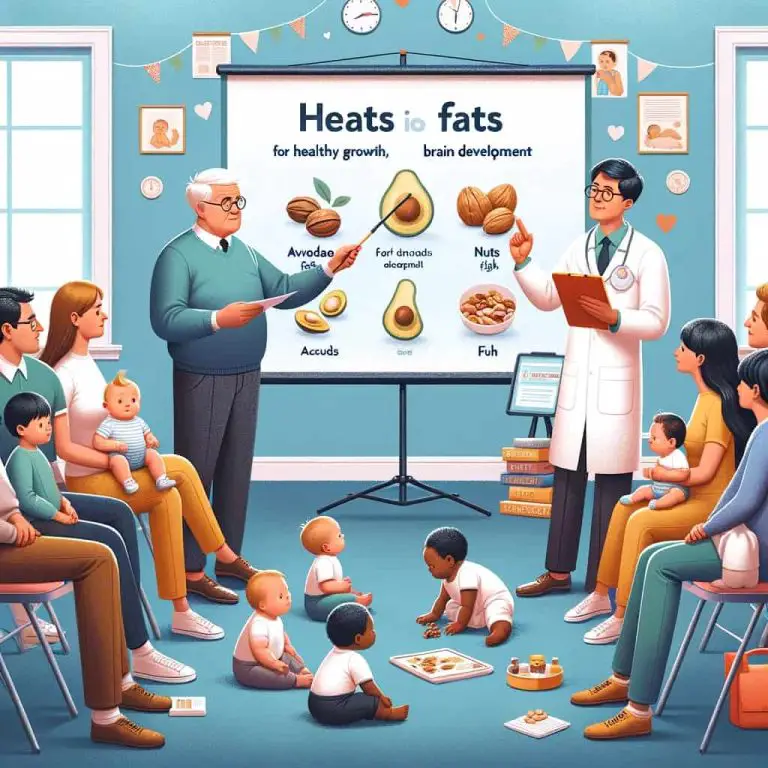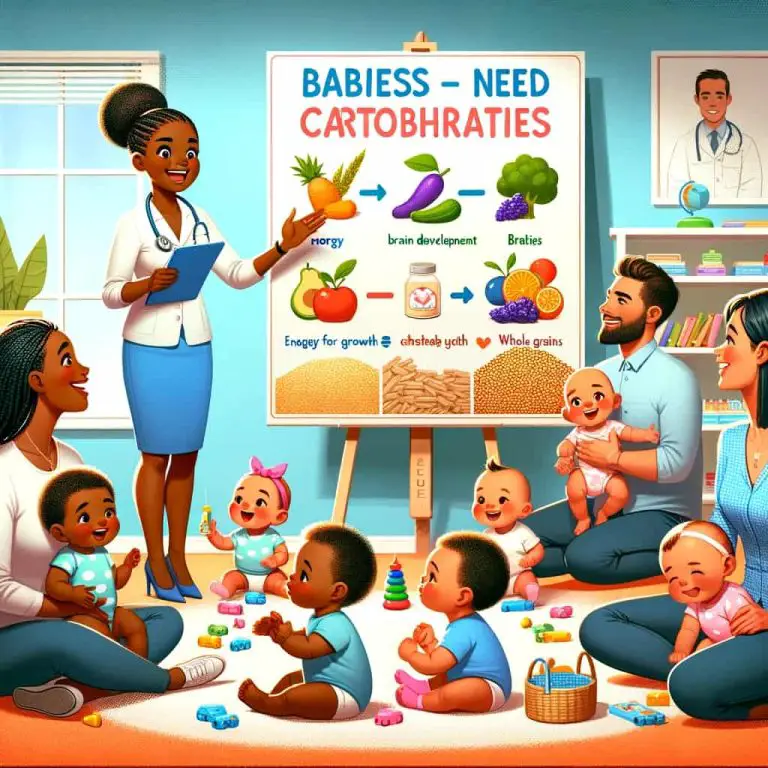How does nutrition affect the baby?

Nutrition profoundly impacts a baby’s development by influencing physical growth, brain development, emotional well-being, and cognitive abilities.
Nutrition plays a crucial role in the development of a baby. Poor diets lacking in key nutrients like iron, folate, and calcium can lead to complications for both the mother and the child, such as low birth weight, developmental delays, and increased risk of illnesses.
It is important for expectant mothers to maintain a healthy and balanced diet to support the growth and well-being of their babies.
The Impact Of Nutrition On Baby’s Health

Proper nutrition plays a vital role in the growth and development of a baby. The nutrients that a baby receives during pregnancy and infancy have a significant impact on their overall well-being. From physical growth to brain development, nutrition has long-term effects on a child’s health.
In this blog post, we will explore how nutrition affects the baby at different stages of their life.
During Pregnancy:
- Adequate nutrition during pregnancy is crucial for the optimal health of both the mother and the baby.
- Poor diets lacking essential nutrients like iodine, iron, folate, calcium, and zinc can lead to complications such as anemia, pre-eclampsia, hemorrhage, and even maternal death.
- Insufficient nutrition during pregnancy can also result in stillbirth, low birth weight, wasting, and developmental delays in children.
Infancy And Early Childhood:
- Nutrition continues to be of utmost importance after birth, as it directly influences a baby’s growth and development during the first few years of life.
- A well-balanced diet rich in essential nutrients supports the physical growth of infants, ensuring they reach appropriate milestones.
- The brain develops rapidly during infancy and early childhood, with proper nutrition playing a critical role in cognitive development.
- Adequate nutrition reduces the risk of illness and disease, enabling children to perform well in school and have a healthier overall life.
Impact On Emotional Well-Being:
- Good nutrition not only affects the physical and cognitive aspects of a child’s development but also has a significant impact on their emotional well-being.
- Research has shown that children who receive proper nutrition are more likely to have stable mood regulation and better mental health.
- Nutrient deficiencies, on the other hand, can lead to mood swings, and irritability, and even contribute to the development of mental health disorders.
- By providing a balanced and varied diet, parents can optimize their child’s emotional well-being and overall happiness.
Long-Term Health And Disease Prevention:
- Early nutrition has long-term effects on a baby’s health, not just during infancy and childhood but also in their adult life.
- A well-nourished baby is less likely to develop chronic diseases later in life, such as obesity, diabetes, and cardiovascular disorders.
- Nutritional interventions during early life can help establish healthy eating habits and reduce the risk of future health issues.
- It is important for parents to prioritize nutrition from the very beginning to promote long-term health and well-being in their children.
Nutrition plays a crucial role in the baby’s growth and development at all stages of life, starting from pregnancy through childhood. Providing a well-balanced diet with essential nutrients ensures optimal physical, cognitive, and emotional well-being, while also reducing the risk of future health problems.
By understanding the impact of nutrition on a baby’s health, parents can make informed choices that contribute to their child’s overall wellness.
The Role Of Nutrition In Fetal Development

A diet lacking in essential nutrients can lead to complications such as anemia, pre-eclampsia, and developmental delays for the child. It is important for expectant mothers to maintain a balanced diet to ensure optimal growth and health for their babies.
Nutrition plays a crucial role in the development and growth of a baby during pregnancy. A well-balanced and nutrient-rich diet is essential to ensure the health and well-being of both the mother and the fetus. Here are some key points highlighting the importance of nutrition in fetal development:
- Proper Brain Development: Adequate intake of nutrients like omega-3 fatty acids, choline, and iodine during pregnancy is important for the baby’s brain development. These nutrients support the growth of neural structures and help in the formation of synapses.
- Healthy Weight Gain: A nutritious diet provides the necessary calories and nutrients required for the baby’s growth. It helps in maintaining a healthy weight gain during pregnancy, which is crucial for the overall development of the fetus.
- Strong Bones and Teeth: Calcium and vitamin D are essential for the development of strong bones and teeth in the baby. Adequate intake of dairy products, leafy greens, and fortified foods can help meet the calcium and vitamin D requirements.
- Reduced Risk of Birth Defects: Proper nutrition during pregnancy can significantly reduce the risk of birth defects in the baby. Folic acid, for example, is essential for the development of the baby’s neural tube, and its deficiency can lead to conditions like spina bifida.
- Immunological Development: Certain nutrients, such as vitamin C, vitamin E, and zinc, play a crucial role in the development of the baby’s immune system. A well-nourished mother passes on these nutrients to her baby, providing them with a good foundation for a healthy immune system.
- Prevention of Preterm Birth: Adequate nutrition, especially with a focus on protein intake, can help reduce the risk of preterm birth. It also contributes to the growth and development of organs and tissues in the baby.
- Optimal Organ Development: Nutrients like iron, vitamin A, and vitamin E are essential for the development of various organs in the baby, including the heart, lungs, and liver. A deficiency in these nutrients can lead to complications and developmental issues.
- Improved Cognitive Function: Proper nutrition during pregnancy has been linked to improved cognitive function and IQ in children. Nutrients like iron, iodine, and omega-3 fatty acids are particularly important for brain development.
- Lower Risk of Chronic Diseases: Good nutrition during pregnancy can help reduce the risk of chronic diseases, such as diabetes and obesity, later in life for the baby. It sets the foundation for a healthy lifestyle right from the start.
- Overall Health and Well-being: Adequate nutrition supports the overall health and well-being of both the mother and the baby. It helps in maintaining energy levels, reducing the risk of complications, and promoting a healthier pregnancy.
Nutrition plays a vital role in fetal development. A well-balanced diet, rich in essential nutrients, is crucial to ensure the healthy growth and development of the baby. It is important for expectant mothers to focus on consuming a variety of nutrient-dense foods to provide their babies with the best possible start in life.
Essential Nutrients For Babies And Their Sources
Proper nutrition during pregnancy is essential for the baby’s development. Key nutrients like iron, folate, calcium, and zinc are crucial for preventing complications such as anemia and pre-eclampsia and promoting healthy growth and brain development. Good sources of these nutrients include leafy greens, eggs, beans, salmon, and yogurt.
Proper nutrition is crucial for the growth and development of a baby. During their early years, babies require a wide range of nutrients to support their overall health and development. Here are some essential nutrients for babies and their sources:
- Protein: Protein is essential for building and repairing tissues, as well as supporting the baby’s overall growth. Good sources of protein for babies include breast milk, formula milk, cottage cheese, yogurt, and lentils.
- Carbohydrates: Carbohydrates provide energy for the baby’s daily activities and growth. Healthy sources of carbohydrates for babies include fruits, vegetables, whole grains, and sweet potatoes.
- Healthy Fats: Healthy fats are necessary for brain development and the absorption of fat-soluble vitamins. Breast milk and formula milk are excellent sources of healthy fats. Avocado, oily fish like salmon, and nut butter are also good options.
- Calcium: Calcium is crucial for the development of strong bones and teeth. Breast milk and formula milk provide a good amount of calcium. Other sources include yogurt, cheese, fortified cereals, and leafy green vegetables like spinach.
- Iron: Iron is essential for healthy blood and brain development. Breast milk and iron-fortified formula milk are good sources of iron. Once babies start eating solid foods, iron-rich foods include pureed meat, beans, lentils, fortified cereals, and tofu.
- Vitamin D: Vitamin D is necessary for the absorption of calcium and the growth of healthy bones. Breastfed babies should receive a vitamin D supplement recommended by their healthcare provider. Sun exposure and fortified foods like infant formula and cereals also provide vitamin D.
- Vitamin C: Vitamin C strengthens the immune system and helps with iron absorption. Fruits like oranges, strawberries, and kiwi are excellent sources of vitamin C. Vegetables like broccoli, tomatoes, and bell peppers also contain vitamin C.
- Fiber: Fiber aids in digestion and prevents constipation in babies. Fruits, vegetables, whole grains, and legumes are rich in fiber. As babies transition to solid foods, offering pureed or mashed versions of these foods can help meet their fiber needs.
Remember, each baby is unique, and their nutritional needs may vary. It is always important to consult with a healthcare provider or a pediatric nutritionist to ensure that your baby is receiving the right balance of nutrients for optimal growth and development.
The Impact Of Maternal Nutrition On The Baby
Proper maternal nutrition is crucial for the baby’s development. A diet lacking key nutrients like iron, folate, and calcium can result in complications for both the mother and the baby, such as anemia and developmental delays. It is essential for expectant mothers to prioritize their nutrition to support the healthy growth of their baby.
Maternal nutrition plays a crucial role in the development and well-being of the baby during pregnancy. Here, we will discuss the various ways in which a mother’s diet can affect her baby’s health and development.
- Overall health and growth: Proper nutrition is essential for the overall health and growth of the baby. A well-balanced diet provides the necessary nutrients for the baby’s development, including vitamins, minerals, proteins, and carbohydrates. Adequate nutrition ensures that the baby grows to a healthy weight and size.
- Brain development: Maternal nutrition significantly influences the baby’s brain development. Essential nutrients like omega-3 fatty acids, folate, iron, and iodine are crucial for optimal brain growth and function. By consuming a diet rich in these nutrients, the mother can support her baby’s cognitive development.
- Reducing the risk of birth defects: Certain nutrients, such as folic acid, are vital for preventing birth defects. Adequate intake of folic acid before and during pregnancy can reduce the risk of neural tube defects in the baby, such as spina bifida. It is recommended that women of childbearing age consume folic acid supplements and foods rich in this nutrient.
- Building a strong immune system: Maternal nutrition plays a role in developing a strong immune system in the baby. A well-nourished mother can pass on beneficial antibodies to her baby, providing them with initial protection against infections and diseases. Nutrients like vitamin C, vitamin D, and zinc are essential for supporting the immune system.
- Reducing the risk of chronic diseases: Good maternal nutrition can have a long-term impact on the baby’s health. Studies have shown that a balanced diet during pregnancy can help reduce the risk of chronic diseases later in life, such as obesity, type 2 diabetes, and cardiovascular diseases. It’s important for expectant mothers to prioritize nutritious food choices for the benefit of their baby’s future health.
Remember, maternal nutrition goes beyond just the intake of calories. It’s about consuming a variety of nutrient-rich foods that provide the essential building blocks for a healthy and thriving baby. By maintaining a well-balanced diet and seeking guidance from healthcare professionals, mothers can positively impact their baby’s growth and development.
The Consequences Of Poor Nutrition
Poor nutrition during pregnancy can have severe consequences for the baby. It is crucial for expectant mothers to prioritize their nutrition to ensure the healthy growth and development of their baby.
Nutrition plays a crucial role in the development and well-being of a baby. Poor nutrition during pregnancy can have significant consequences for both the mother and the baby. Here are some of the consequences of poor nutrition:
- Increased risk of maternal complications: Diets that lack essential nutrients such as iodine, iron, folate, calcium, and zinc can increase the risk of maternal complications. These complications include anemia, pre-eclampsia, hemorrhage, and even maternal death. It is important for mothers to have a well-balanced diet to support their own health during pregnancy.
- Increased risk of stillbirth and low birthweight: Inadequate nutrition can result in stillbirth and low birthweight babies. Proper nutrition provides the necessary nutrients for the baby’s growth and development in the womb. Without these nutrients, the baby may not reach its full potential and may be at a higher risk of health issues.
- Delayed development: Poor nutrition during pregnancy can lead to developmental delays in children. Nutrients such as iron, folate, and zinc are crucial for brain development. Lack of these nutrients can impact a child’s cognitive and emotional development, resulting in learning difficulties and behavioral problems.
- Increased risk of illness and disease: Nutritional deficiencies can weaken the immune system of both the mother and the baby. This can lead to an increased risk of illness and disease. Babies born to malnourished mothers may have a compromised immune system, making them more susceptible to infections and illnesses later in life.
- Impaired physical growth: Nutrition plays a vital role in a child’s physical growth. Lack of essential nutrients can lead to stunted growth and underweight babies. Proper nutrition is necessary to ensure that the baby reaches its full growth potential.
It is crucial for mothers to prioritize their nutrition during pregnancy to ensure both their own health and the healthy development of their babies. A well-balanced diet rich in essential nutrients should be followed to prevent these consequences of poor nutrition.
Addressing Nutritional Gaps
Proper nutrition plays a vital role in the development of the baby. It is important to address nutritional gaps to ensure a healthy pregnancy and baby.
Nutrition plays a vital role in the health and development of a baby. Ensuring that a baby receives adequate and balanced nutrition is essential for their growth and overall well-being. However, there may be instances where nutritional gaps occur, leaving the baby lacking certain nutrients.
It is important to address these gaps to ensure the baby’s optimal growth and development. Here are some ways to address nutritional gaps:
- Introduction of Solid Foods: As babies transition from a liquid diet to solid foods, it is important to introduce a variety of nutrient-rich foods. This helps to ensure that the baby receives a wide range of essential nutrients, such as vitamins, minerals, and proteins.
- Breastfeeding or Formula Feeding: Breast milk or formula provides crucial nutrients for the baby’s growth and development. If breastfeeding is not possible, choosing an appropriate formula that meets the baby’s nutritional needs is essential.
- Supplementation: In certain cases, supplementation may be necessary to bridge nutritional gaps. This can include vitamin and mineral supplements recommended by a healthcare professional to ensure the baby is getting all the necessary nutrients.
- Diversifying the Diet: Offering a diverse range of foods can help prevent nutritional gaps. Including a variety of fruits, vegetables, whole grains, lean proteins, and dairy products in the baby’s diet can provide a wide array of nutrients.
- Monitoring Growth and Development: Regular monitoring of the baby’s growth and development can help identify any nutritional deficiencies. Healthcare professionals can assess the baby’s growth patterns and provide guidance on addressing any nutritional gaps.
- Cooking and Food Preparation Methods: Careful cooking and food preparation methods can help preserve the nutrient content of foods. Overcooking or excessive processing can lead to nutrient loss, so opting for gentle cooking methods like steaming or sautéing can help retain nutrients.
- Educating Caregivers: Proper education and awareness among caregivers about the importance of nutrition can greatly contribute to addressing nutritional gaps. Caregivers can learn about appropriate portion sizes, food variety, and the importance of including nutrient-rich foods in the baby’s diet.
- Consulting a Healthcare Professional: If there are concerns about the baby’s nutrient intake or if nutritional gaps are suspected, it is important to seek guidance from a healthcare professional. They can provide personalized advice and recommend appropriate strategies to address any nutritional deficiencies.
By addressing nutritional gaps, caregivers can ensure that the baby receives the necessary nutrients for optimal growth and development. Implementing these strategies can contribute to the overall health and well-being of the baby, setting them up for a healthy future.
Case Studies
Proper nutrition during pregnancy plays a crucial role in the baby’s development. A poor diet lacking in key nutrients can lead to various complications for both the mother and the child, such as anemia, pre-eclampsia, low birth weight, and developmental delays.
It is essential for expectant mothers to prioritize their nutrition for a healthy pregnancy.
Here are a few case studies that highlight the effects of nutrition on babies:
Case Study 1: Malnutrition and Its Consequences
- In this case study, we examine the impact of malnutrition on a developing fetus.
- Poor maternal nutrition can lead to a range of issues, including low birth weight and developmental delays.
- Lack of key nutrients like iron, folate, and calcium can increase the risk of complications during pregnancy, such as pre-eclampsia and anemia.
Case Study 2: The Power of Proper Nutrition
- This case study focuses on the positive effects of proper nutrition during pregnancy.
- A mother who consumes a balanced diet rich in essential nutrients can support the healthy growth and development of her baby.
- Adequate intake of vitamins and minerals promotes fetal brain development, physical growth, and a lower risk of illness or disease in childhood.
These case studies demonstrate the significant impact that nutrition can have on the health and development of babies. It highlights the importance of a balanced diet and adequacy of essential nutrients during pregnancy and early infancy.
How Does Nutrition Affect The Baby?
Proper nutrition during pregnancy plays a crucial role in the growth and development of the baby. It not only supports physical growth but also affects the baby’s brain development, emotional well-being, and cognitive abilities. Let’s delve deeper into the impact of nutrition on the little one:
Nutritional Deficiencies And Potential Consequences:
- Inadequate intake of key nutrients such as iodine, iron, folate, calcium, and zinc can lead to various complications.
- Anaemia, pre-eclampsia, hemorrhage, and even maternal death can result from a poor diet during pregnancy.
- Insufficient nutrition can increase the risk of stillbirth, low birth weight, wasting, and developmental delays in children.
Physical Growth And Development:
- Nutrition has a direct impact on a baby’s physical growth. A well-balanced diet ensures that the baby gains the necessary weight and length during gestation.
- Optimal nutrition supports the development of vital organs, bones, muscles, and overall body structure.
- A baby with proper nutrition has a higher chance of maintaining a healthy weight throughout childhood and reducing the risk of illnesses or diseases.
Brain Development And Cognitive Abilities:
- Nutrients such as omega-3 fatty acids, choline, and iron are essential for brain development.
- Adequate nutrition during pregnancy supports the formation of neural connections, improving the baby’s cognitive abilities.
- A child born to a mother who received proper nutrition during pregnancy tends to perform better academically.
Emotional Well-Being And Mental Health:
- Nutrition also plays a role in a baby’s emotional development.
- Certain nutrients, like omega-3 fatty acids and B vitamins, are associated with positive mood and emotional regulation.
- A well-nourished baby is more likely to have better mental health outcomes.
The impact of nutrition on a baby’s growth and development during pregnancy cannot be overstated. Poor nutrition can lead to a range of complications for both the mother and child. By ensuring a well-balanced diet during pregnancy, mothers can give their babies the best possible start in life.
It is essential to consult with healthcare professionals for personalized advice and guidance regarding nutrition during pregnancy.
Frequently Asked Questions On How Does Nutrition Affect The Baby?
Why Is Nutrition So Important During Pregnancy?
Proper nutrition during pregnancy is crucial. Inadequate diets can cause complications for both the mother and the baby, such as anemia, pre-eclampsia, stillbirth, and developmental delays. It’s important to consume key nutrients for a healthy pregnancy.
How Does Nutrition Affect Child Development?
Good nutrition directly impacts a child’s physical and brain development, emotional well-being, and cognitive abilities. It helps them maintain a healthy weight, perform well in school, and reduce the risk of illness or disease.
Can The Mother’s Diet Affect The Baby’s Allergies?
Research suggests that a mother’s diet while pregnant or breastfeeding may influence the development of allergies in the baby. Avoiding common allergens during pregnancy or breastfeeding may help reduce the risk of the baby developing allergies. However, it is essential to consult a healthcare professional for personalized advice based on individual circumstances.
What Should A Pregnant Woman Eat For The Baby’s Nutrition?
A pregnant woman should consume a healthy, varied diet that includes fruits, vegetables, whole grains, lean proteins, and dairy products. It is important to eat foods rich in folic acid, iron, calcium, and omega-3 fatty acids. A doctor or nutritionist can provide specific dietary recommendations tailored to individual needs.
Conclusion
It’s essential for expectant mothers to maintain nutritional balance. A poor diet lacking in essential nutrients can have detrimental effects on both the mother and the child. Therefore, it is crucial for expectant mothers to prioritize their nutrition and ensure they are getting the necessary nutrients for the well-being of both themselves and their babies. Besides that mothers should be concerned about nutritional requirements for babies. By making conscious choices about their diet, mothers can provide the best possible start in life for their little ones.






